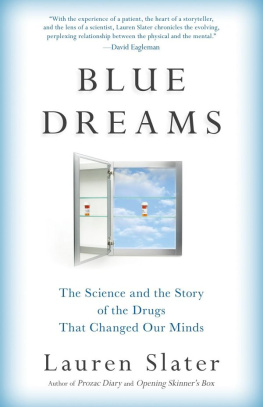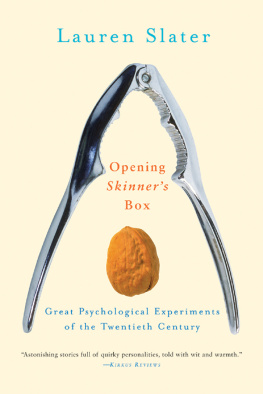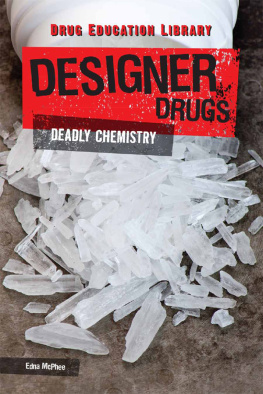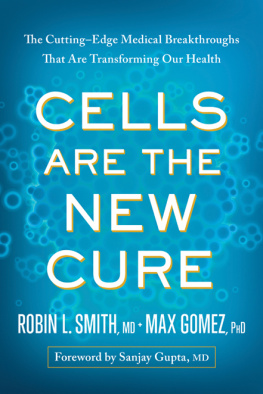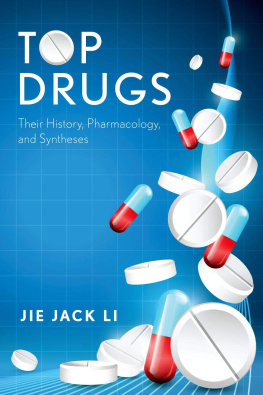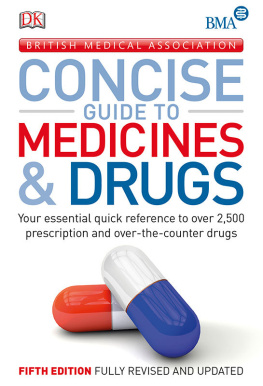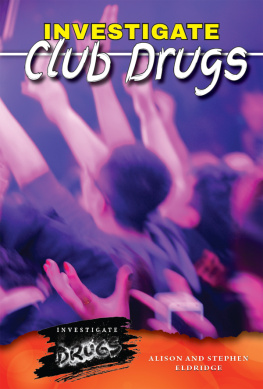Everything in this book is true. However, there are certain instances in which I have changed the names and identifying features of people I interviewed, at their request and to protect their privacy. There are other instances, however, in which names have not been changed. I allowed each subject to make that decision according to his or her comfort.
All autobiographical material emerged from my memory of events that sometimes happened as many as forty years ago or more. I composed my memories as they occurred to me and checked their accuracy by relying on family members who were with me at the time, when this was possible. I have made every effort to be accurate while also acknowledging that memories are friable, delicate webs held together by neuronal connections and chemicals we do not yet fully understand.
I wrote this book because I have been taking psychotropic drugs for thirty-five years, with different drugs or drug combinations during different decades of my life. Some of these drugs have been miraculously effective for a time, while others have done nothing but leave me with side effectsincreased sweating, a rapid heartbeat, a mouth so dry my teeth began to rot in their sockets. Of every doctor who has ever prescribed me a psychotropic drug I have asked the same questions: How does it work? And, more existentially, how do you know I need it?
What did I mean by that second question? I meant that while I had symptoms galore, I had no physical proof that anything was wrong with me at all. Several times during my adult years, for instance, Ive wound up in the emergency room for a bad case of strep throat, and each time the physician has instructed me to open my mouth and stick out my tongue while he peered into me with a flashlight and swirled a cotton swab around in the redness, after which he smeared my cells on a slide that would be tested to confirm the diagnosis and I would be prescribed the trusty cure, an antibiotic. Similarly, I keenly remember the morning of September 26, 1998, waking at dawn and popping my ovulation thermometer into my mouth, beep beep, my temperature still high, a sign I might be pregnant. The night before, in the bathroom, I had lined up the kits, not one but three, all with their little wells and the plastic cup to collect my urine. I got out of bed carefully, so as not to wake my husband. The bathroom was dark, the sun just hitting the horizon and extending a single ray into the sky. I peed into the collection cup and then, using the dropper, deposited my urine into the wells and watched, transfixed, as the test wands turned color, going from white to blue to red. A single line emerged, and thenwas it? did I see it?a second line began to form, faint but definite. The tests were telling me the most important piece of news Id received so far in my life: I was gravid, with child, on the edge of my motherhood, a knowledge that filled me with fear and ecstasy. Because Im compulsive by nature, I took a test every day for a week, watching the second line, the yes line, grow bolder and bolder, a sign that my HCG, a hormone secreted in early pregnancy, was rising.
There are no such surefire tests for determining depression. The truth is that while we have dozens and dozens of psychiatric drugs, while by conservative estimates one out of every five Americans is on a psychiatric drug, we still have no actual blood or urine or tissue test with which to determine the particular psychiatric illness a person suffers from. The body or brain of someone suffering from severe depression may very well be deeply different from the body or brain of someone of what we call normal mood, but if physical substrates of mental suffering do exist, psychiatry has so far been unsuccessful in definitively finding them. Therefore, when you take a psychiatric drug, you do so on faith. It is a great leap of faith, in fact, to take a drug when the doctor cannot actually find anything wrong with your body. Yes, you may be sleeping more or less than usual. Yes, you may be eating more or less. But these symptoms do not give rise to any particular chemical malfunction in your urine, your blood, or your skin.
All I know for sure is that in my case, when I took my first psychiatric drugimipramine for depressionat nineteen years of age, my body seemed to be healthy, even if my heart hurt. Now, thirty-five years and twelve drugs later, my kidneys are failing, I have diabetes, I am overweight, and my memory is perforated. As the years close in on me, my lifetime now seems seriously foreshortened, not because of a psychiatric illness but because of the drugs I have taken to treat itwith diabetes and kidney trouble being just a couple of the well-documented side effects associated with the powerful antidepressant and antipsychotic Zyprexa, a drug Ive relied on like some do a walker, propping me up so I can sail through my days, going as fast as I can in the hope I will get everything done before I die. It would not be an overstatement to say that on the one hand, psychiatric drugs have healed me, while on the other, they have taken my life and my health and ruined me, drawing death near. Because of the diabetes, I get sores on my feet, festering sores that ulcerate and ooze. At fifty-four years old, my body is in the shape of an octogenarian with issues.
But I am not angry at psychiatry for limiting my life the way it has, even as my decaying body scares me to my roots. Although the first psychotropic I took did me no good, the second one felt as if it had hurled me to heaven, where I lived a gilded life, rich and buttery, producing books and babies as fast as I could, because I knew the Prozac would wear off, and eventually it did. The next drug, the antidepressant Effexor, also eventually stopped working, and thus I became a consumer of polypsychopharmacy, sustained on a potentially lethal cocktail of drugs. My particular mix includes the risky Zyprexa, another antipsychotic called Abilify, Effexor, the anti-anxiety medication Klonopin, the stimulant Vyvanse, and probably one or two other pills Im forgetting because there are so many. Because of these drugs, I am able to think, to compose, and to move productively through my life, although I do struggle with aphasia. Whats a little memory loss, though, in exchange for a robust ability to cope?
My marriage of two decades recently dissolved, and yet I get up each day and find joy in being alive. Thats what I call a robust ability to cope. Thats what I call proof that these drugs work, maybe too well. Shouldnt I be shedding tears? I do, of course, but what I dont do is get sucked into the quicksand of despair. I feed my chickens. I ride my ponies. I make my gardens, which are right now blooming in the springs first warmth, the salvia growing out of the ground in purple spires, the lupine sending up its colored cones, the false indigo blooming its excess of blues.

